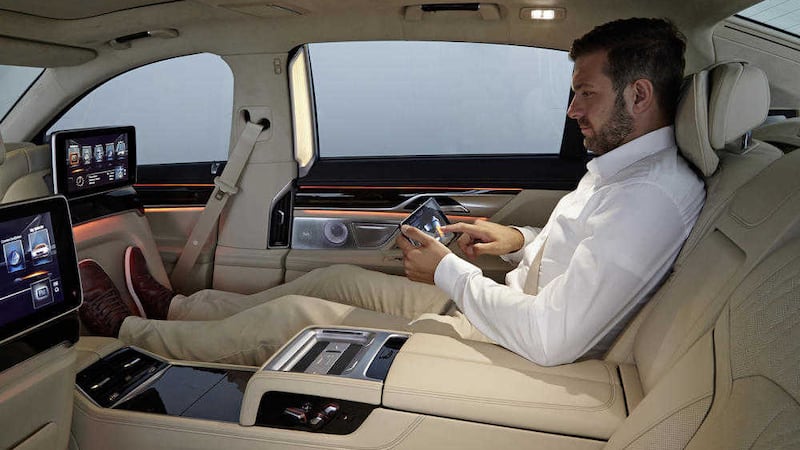THE age of the truly self-driving car is upon us. Well, almost.
Most of the technology needed to make your car steer, accelerate and brake by itself is already available on vehicles you can go into a showroom and buy, today. BMW, Tesla, Audi, Mercedes-Benz and Volvo are among those leading the way.
Weaving all of this tech together - particularly the systems needed to detect wandering pedestrians and cyclists - in such a way that legislators and insurers are satisfied it is resilient enough to allow autonomous vehicles fully loose on our roads without risk of mass casualties and bumper insurance claims is still thought to be some way off.
However, anyone who braves the M1 morning commute to Belfast may have long suspected that this brave new epoch had arrived years ago.
How else to explain the magical cars which, like latter day Chitty Chitty Bang Bangs, allow those sat behind the steering wheel - it seems wrong to call them 'drivers' - to get on with any number of other tasks once the traffic slows to its inevitable crawl around Sprucefield?
Reading the paper, buttering toast and making mugs of tea are just some of the remarkable feats these cars allow their 'drivers' to accomplish without once looking at the road.
Sometimes, you will see a male driver run an electric shaver over his jaw but - at the risk of being labelled a Pootsista - a dedicated group of women drivers seem able to extract the greatest benefit from their autopilot cars by applying their make-up and straightening their hair while sat behind the wheel.
It is possible - just about, I suppose - that Volvo, BMW, Ford, Google, Apple and every other automotive and tech giant is using Northern Ireland as a test bed for their self-driving cars.
Possible, yes, but highly unlikely, particularly when the vehicles in question tend to be Anna and Elsa from Frozen-spec Fiat 500s, sausage roll-laden Ford Transits and late-braking Audi A4s.
The more persuasive explanation is that the drivers are dangerous, unobservant idiots with an exaggerated opinion of their abilities behind the wheel.
After the rise of the smart phone, the age of the smart car is dawning - but what of the smart driver?
The assembly last week passed a bill which, when its various provisions eventually become law, will not only toughen drink-driving limits but also mean it is more arduous for learner drivers to get their licence.
Whether it makes them smarter drivers is another question.
Under a system of so-called graduated driving licensing, new drivers will have to complete a learning period of at least six months before they can be tested and earn a full licence.
Learners will need to complete a logbook and because the 45mph limit for L- and R-plate drivers is being scrapped, they will be able to take lessons on motorways - a thus far glaring omission in driver training. There will be restrictions on the age and number of passengers that a newly-qualified driver can carry.
A more thorough learning process can only be a good thing, and there may even be spin-off benefits in terms of lower premiums if the insurance industry is persuaded that the new measures do, in fact, contribute to safer roads.
Clamping down further on drink-driving is impossible to argue against. As environment minister Mark H Durkan, who has chauffeured the Road Traffic (Amendment) Bill through the assembly, pointed out, more than 2,000 deaths and serious injuries have been caused by drug- and drink-driving since 2000.
There is also solid logic in focusing so hard on learner and younger drivers.
Young and newly-qualified drivers play a disproportionate role in the tragedy of death and destruction on our roads, being three times more likely to be killed than anyone else. Drivers under-25 years old are also four times more likely to be responsible for fatal accidents than older motorists.
But that doesn't fully explain why we are continuing to endorse a system that does not require drivers to undertake any further training or refresher lessons once they have passed their test. For example, basic tuition in how to handle a skid and drive on snow and ice would benefit all road users.
Driving lessons, after all, teach you how to perform a three-point turn, pass the test and get the licence; but this is a different thing from driving safely and acquiring the higher-order skills of assessing risk and decision-making.
It also overlooks the fact that while it is possible to become a better driver over time, it is equally possible to become a worse one - which brings us back to the M1 self-drivers.
Around 76 per cent of adults in Northern Ireland hold a driving licence, and it stretches credulity to imagine that they are all as safe behind the wheel as they were when they passed their test.
Licences are valid for 10 years, so perhaps a sensible place to start is for every renewal to be conditional on the driver completing a short course of refresher lessons and an assessment of their competence and ability to 'read' the road.
The new rules for learner drivers are undoubtedly a decisive move in the right direction. But if our politicians were to focus on ways to raise the standards of everyone's driving, then we might also gain safer roads and smarter drivers that would be the envy of the world.









